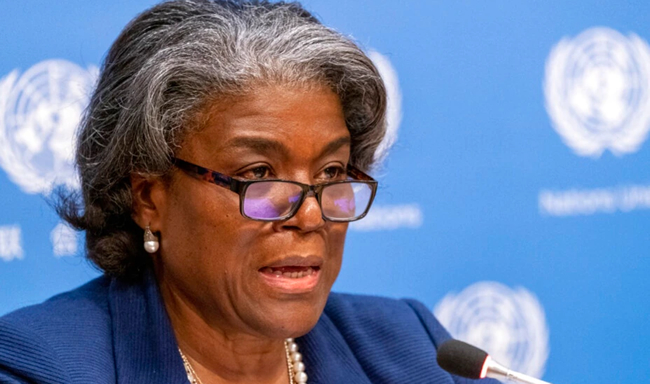
Ambassador Linda Thomas-Greenfield, the United States Ambassador to the United Nations, has lauded Ghana for its role in advancing peace and stability in the West African sub-region.
“Ghana’s leaders have worked tirelessly to raise Africa’s perspectives and concerns at the UN Security Council while deploying thousands of troops to serve in UN peacekeeping missions in Africa,” she noted.
Ambassador Thomas-Greenfield, speaking on peace and security in Africa at the Kofi Annan International Peacekeeping Training Centre (KAIPTC) in Accra on Tuesday, said Ghana had enabled peaceful transitions of power, free press and resilient democratic processes that had served as a model for other countries.
Ambassador Thomas-Greenfield is participating in the 2023 UN Peacekeeping Ministerial Conference in Accra, Ghana.
Delegates from more than 85 countries and international organisations are in Accra to discuss the support and commitments needed to strengthen current and future UN Peacekeeping operations.
The US in advancing Africa’s peace and security since the beginning of the Biden Administration has invested 6.5 billion dollars to support security, democracy, human rights and governance on the continent.
Despite the strides and the seemingly intractable challenges in peacekeeping, Amb. Thomas-Greenfield said, there was an emergence of new challenges particularly in Sudan where a “senseless conflict” had led to one of the worst humanitarian crises in the world.
She said, throughout the Sahel, there had been coups and democratic backsliding, denying citizens the right to dictate their own futures.
The US Ambassador to the UN said across the continent, “we have witnessed violent extremism take hold and spread, destabilising the entire region. I have seen the horrific toll that this violence takes on the individuals and on entire communities.”
These alarming developments, she said, threatened peace and security not only in Africa, but across the globe.
Amb. Greenfield said while those problems were not specific to Africa, African leadership had and would continue to play a major role in solving them.
She said unfortunately, some leaders in other countries had taken the opposite tag, choosing to turn their backs on the international system to consolidate power for themselves at the expense of the rights, freedoms and prosperity of their own people.
She said they had isolated themselves in their populations from regional institutions like the Economic Community of West African States (ECOWAS), African Union (AU) and the United Nations (UN) and turned to actors like the Wagner Group, a Russian state-funded private military company, which she said advanced conflict, exploitation, and destruction for a profit.
“This is a dangerous decision, and it is a short-sighted one,” she said, citing Mali where the transition government chose Wagner and kicked a UN peacekeeping mission out of the country, including Ghanaian soldiers.
“In no time at all, the fragile balance holding the peace agreement together fell apart, empowering violent extremism groups and creating incivility that threatens West Africa,” Amb. Thomas-Greenfield noted.
“The decision hasn’t made Mali safer. In fact, after Wagner was invited into Mali in 2021, more civilians were killed in 2022 than any other year since the conflict began in 2012,” she said.
According to Amb. Thomas-Greenfield, it was clear that the approach had not worked and that traditional tools to keep peace must be adopted as Africans deserved a better vision for security – one that put African leaders and leadership at the forefront and African people at the centre.
“As an International Community, we have the responsibility to cultivate that system to improve the efficiency, the effectiveness of UN peacekeeping to finance and empower African Union missions and to invest in resilience, open and transparent governance that can prevent and withstand security risks and not simply respond to them.”
Source: GNA























